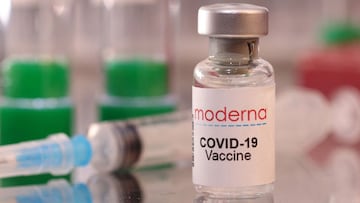Moderna Covid-19 vaccine has edge over Pfizer's - study
An investigation in Qatar which compared Moderna and Pfizer vaccines showed that while they use the same mRNA technology, they differ slightly.

Many people believe that the Covid-19 vaccines independently developed by Pfizer and Moderna, both of which use mRNA messenger technology to help the immune system identify and respiond to the coronavirus, are one and the same. But there exists differences between the two. Comparative, controlled studies conducted in Qatar involving a sample of 384,246 people showed that the Moderna shot gives protection for a greater length of time than the Pfizer vaccine.
Studies reveal the best protection against Omicron
Both studies involved the same population of persons who had received both doses of the Moderna or Pfizer vaccines between 21 December 2020, and 20 October 2021 The results of the study were published in The New England Journal of Medicine and demonstrate that the Moderna jab loses effectiveness much later than the Pfizer jab - an occurrence which became evident as the sixth Covid-19 wave hit.
Immunity against Covid-19 wanes over time which is why a booster shot, of an mRNA vaccine, has become essential - no just in healthy young people but especially in those with underlying conditions who are more at risk. But patients don't get to choose which vaccine they receive - either in the first two doses or the booster shot - that depends entirely on availability.
In two matched retrospective cohort studies comparing BNT162b2 and mRNA-1273, both were highly effective at preventing hospitalization & death. Breakthrough infections were lower among those who received mRNA-1273 than those who received BNT162b2. https://t.co/wgkrzfLNHz pic.twitter.com/E8hXIDFqWW
— NEJM (@NEJM) January 19, 2022
44% more cases of infections
The Moderna shot provided the same level of immunity after 120 days as Pfizer's did after 90 days. The difference is even greater when looking at immunity in the medium term - 180 days in the case of Moderna was equal to 130 days for the Pfizer jab. That difference could be decisive in stopping localised outbreaks.
According the study, those who received the Pfizer jab were 44% more likely to be infected than those innoculated with the Moderna vaccine. Among the Moderna–vaccinated persons, 878 breakthrough infections were recorded after the second dose at a median follow-up of 89 days. Of these infections, three progressed to severe Covid-19 (acute-care hospitalization), but none progressed to critical disease (hospitalization in an intensive care unit) or death.
Related stories
In contrast, of the Pfizer-vaccinated persons, 1262 breakthrough infections were recorded after the second dose at a median follow-up of 86 days. Of these infections, seven progressed to severe Covid-19, none to critical disease, and just one resulted in death. In both vaccinated cohorts, breakthrough infections tended to occur among persons with a longer interval since the time of vaccination.
The study makes no mention of the Omicron variant or includes any data on the effects on immunity after the booster shot.

